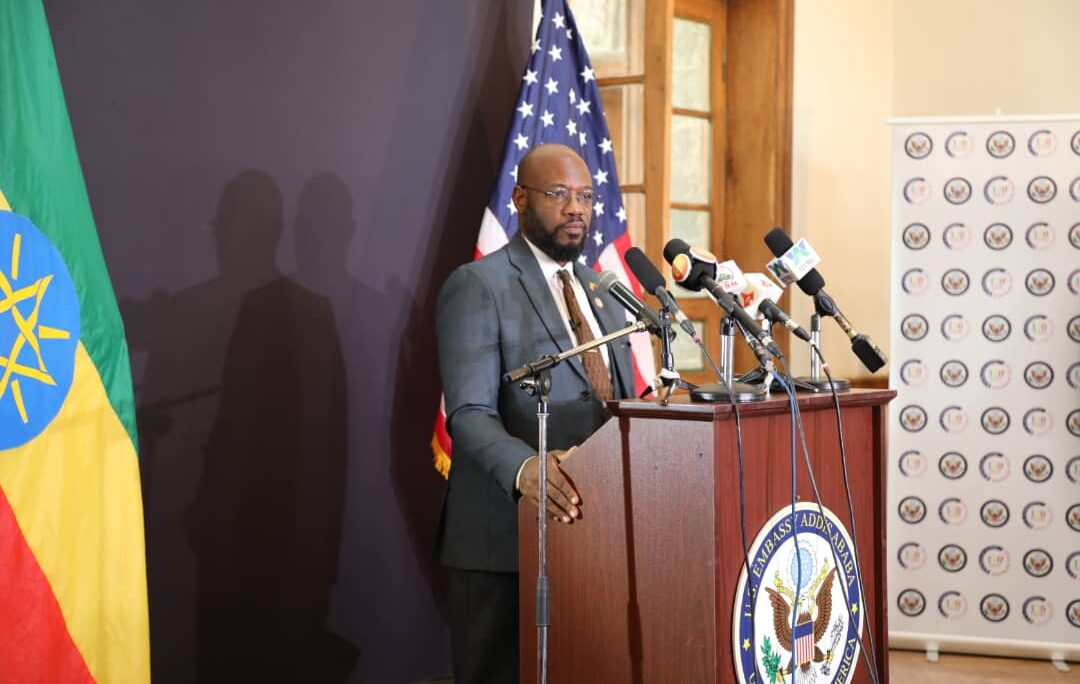The US Ambassador to Ethiopia Ervin J. Massinga’s Speech on FANO Militia: A Quick Analysis
By: Abe Lema
On May 15, United States Ambassador to Ethiopia Ervin J. Massinga made his first visit to the American Gibbi in Addis Ababa and delivered a policy address on human rights and national dialogue. The Ambassador highlighted key aspects of U.S. policy toward human rights and emphasized the imperative to protect human dignity and pursue peace through dialogue rather than violence. Addressing specific regions within Ethiopia and those governing Ethiopia, he urged genuine efforts for peace and reconciliation. In particular, he stated:
“To those fighting in Amhara, to those that call themselves the Fano, please know that your rejection of dialogue does not serve you well. As in other parts of Ethiopia, it is innocent civilians who are suffering as a result of the continued fighting. Many in Amhara are passionate that their cause is just – if so, you should make those arguments through dialogue and not violence.”
The policy speech by the U.S. Ambassador to Ethiopia specifically addressing the FANO militia would have significant implications, considering the complex political and security dynamics in Ethiopia. Here are potential implications:
- Renaming and Terminolog
- While the Ambassador acknowledges the Oromo Liberation Army (OLA) by its preferred name, unlike the Ethiopian government’s term “Shene,” he does not use the official name “FANO” but refers to them as fighters. This deliberate choice may have been influenced by government narratives about the FANO militia.
- Rejection of Dialogue:
- The U.S. has not previously called for dialogue between the Prosperity Party (PP) and FANO, unless the Ambassador is referencing the pseudo-dialogue efforts recently announced by the PP’s Dialogue Commission. The speech may lead to prejudice and misjudgment of FANO’s struggle for justice and equality. The Ambassador’s speech unequivocally condemns FANO as a perpetrator of violence and implicitly acknowledges the destructive measures of the PP on civilians. This could wrongly portray the PP as advocates of peace and reconciliation while ignoring their brutal actions on the ground.
- Internal Politics:
- Addressing the FANO militia as an obstacle to the peace process could impact internal politics in Ethiopia. Depending on the stance taken by the Ambassador, it could be perceived as interference in Ethiopia’s internal affairs or as a legitimate expression of concern regarding human rights and security issues. The speech may influence public opinion and shape political discourse within Ethiopia.
- Security Situation:
- Highlighting concerns about the FANO militia’s involvement in armed struggle as violence could exacerbate security concerns in Ethiopia. It may embolden the Ethiopian government to persist in its actions under the guise of maintaining law and order in regions where the militia operates, potentially leading to further human rights abuses.
- International Perception:
- The speech could shape international perceptions of FANO’s struggle. Depending on the Ambassador’s remarks, it may affect how FANO is viewed by the international community, including other governments, multilateral organizations, and human rights groups.
- Just Causes:
- The Ambassador’s remark, “Many in Amhara are passionate that their cause is just,” suggests that the U.S. has conducted some assessment on the ground, recognizing that the struggle is supported by the general public for whom FANO is fighting. While urging FANO to engage in dialogue rather than violence, the speech acknowledges that their cause may be perceived as just by many. This nuanced understanding of the complex political and social dynamics in Amhara recognizes the legitimacy of grievances fueling support for the militia and may boost the political and military morale of FANO, countering the PP’s rhetoric that seeks to divide FANO from its people.
- Peace and Stability:
- Addressing the FANO militia could have implications for peace and stability in Ethiopia and the wider region. The speech may contribute to efforts to mitigate conflict and promote peacebuilding initiatives, or it could inadvertently fuel tensions and exacerbate existing grievances.
Summary
A policy speech by the U.S. Ambassador to Ethiopia about the FANO militia could have far-reaching implications for diplomatic relations, internal politics, security dynamics, human rights, ethnic relations, international perception, and efforts to promote peace and stability in Ethiopia. It is essential for such speeches to be carefully crafted and mindful of the potential impacts on various stakeholders and the broader context of Ethiopian politics and society
























